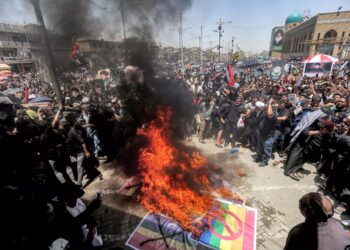After 16 years of war, U.S. President Donald J. Trump‘s new Afghanistan strategy looks set to borrow from his commanders’ tactics against Islamic State in Iraq and Syria.
Last Monday night, Mr. Trump announced what he called a dramatic shift in U.S. operations in Afghanistan. America, he said, will adopt a counterterror strategy that prioritizes operational results and abandons nation-building, a key feature of his predecessors’ approaches to the war.
Mr. Trump said he would give commanders more authority on the ground, a tactic he has embraced for the Islamic State fight and other U.S. military operations.
Speaking to reporters in Baghdad on Tuesday, Defense Secretary James Mattis said he would borrow a strategy from the Coalition operations in Iraq.
“We’re going to take a lot of things forward, but we also recall that every war is unique unto itself,” Mr. Mattis said.
“What applies and what can be used against ISIS elsewhere, we’ll pass this to our friends, partners, allies, whether they be in the Philippines … in Somalia or wherever, Afghanistan.”
Since Operation Inherent Resolve began in 2014, Coalition and Iraqi forces have recaptured an area the size of Switzerland – 40,000 square kilometers – from ISIS in Iraq.
More importantly, the group hasn’t been able to reclaim any of its lost territories.
The number of incidents in Afghanistan, meanwhile, has increased over the last year, according to the latest Inspector General report to the Congress. Deadly terrorist attacks have occurred in northern Afghanistan and Kabul, areas that were previously considered stable.
Patrick James, the Dornsife Dean’s Professor, School of International Relations at the University of Southern California, said some of the lessons from the Islamic State fight transfer well to operations in Afghanistan.
“One transferable lesson is to avoid telling the enemy or just people in general what you are going to do next,” Mr. James told The Globe Post. “It has a way of helping the adversary. Assad, along with extremists of other kinds in Iraq and Syria, no longer have the benefit of hearing things ahead of time.”
He noted that President Barack Obama had a habit of putting time limits on operations or announcing U.S. military actions ahead of time, such as the drawback of forces from Afghanistan and his administration’s “pivot to Asia.”
It is easy to see the successes of the Coalition military campaign against ISIS in Iraq as a blueprint for Afghanistan where U.S. and local forces are fighting the Taliban, a number of al-Qaeda linked groups, and the local ISIS branch that calls itself Wilayat Khorasan (the U.S. has dubbed it ISIS-K).
Both countries offer to Mr. Trump and Mr. Mattis a willing government the U.S. can work “by, with and through,” and a partner force to train and supply, thereby limiting the number of U.S. troops to a number more palatable for American voters.
Michael Kugelman, the deputy director of the Asia program and senior associate for South Asia at the Woodrow Wilson Center, told The Globe Post that drawing too many analogies between Iraq and Afghanistan is a dangerous game.
“It’s important not to be blinded to the successes of counter-ISIS operations in Iraq and to think that just because they went so well in Iraq, they can go well everywhere. In Afghanistan, there are different contexts and dynamics,” Mr. Kugelman said.
He noted the drivers of conflict are very different in the two countries.
“In Iraq, you had a viciously sectarian environment that enabled ISIS to emerge and flourish. Afghanistan doesn’t have such sharp sectarian divides, and ISIS hasn’t been able to grow as potent.”
Mr. Kugelman has argued before that the ethnic divisions in Afghan society should not be compared too closely to the sectarian divisions that gave ISIS a towpath through Iraq.
Unlike the Iraqi government of former Prime Minister Nouri al-Maliki, Afghanistan’s leadership has been relatively inclusive, he explained.
ISIS also has a modest footprint in Afghanistan, in part because it has to compete with other militant groups, most of which are allied with its rival al-Qaeda.
“What this suggests is that the Iraq template won’t necessarily fit in Afghanistan,” Mr. Kugelman concluded.
On Thursday, Gen. John Nicholson, the top American commander in Afghanistan, said the U.S. will double the size of the Afghan Commandos and the counterterrorism special forces unit, Ktah Khas.
Recruitment and training for additional forces have already begun, Gen. Nicholson said.
Speaking in Kabul, Gen. Nicholson said, “the United States is determined to continue to support the Afghan security forces in the fight against the Taliban, the Haqqani Network, Daesh, al-Qaeda, and all terrorist groups.”
That support is likely to include more U.S. troops; the Pentagon could deploy up to 3,900 troops, adding to the 8,500 already in the country.
U.S. troops are officially tasked with a “train, advise, and assist” mission to boost the Afghan National Army and other security forces’ capabilities.
Mr. James advised that what the U.S. military actually does while deployed is important.
“Troops do very poorly when told to simply stay in the field. IED and other losses in unconventional ways cause morale to go through the floor,” he explained. “An emphasis on winning changes the mindset in a positive way.”
He said the military will have to deal with the awkward issue of rules of engagement, as previous deployments have been self-censored in their actions “in terms of what they do that might cause collateral damage.”
“U.S.-led forces will have to fight in a more classic style – here I mean much less concern for what the media might report – if there is going to be any real success.”
Mr. Mattis on Tuesday said he had not yet decided on the number of additional U.S. troops to deploy, explaining that first he had to “level the bubble, and account for everybody that is on the ground there now.”
Mr. Trump reportedly refused to sign off on the Pentagon’s previous proposal for boosting the U.S. troop presence by 4,000 soldiers.
The maximum number of U.S. troops currently permitted to be deployed to one of the two U.S. missions – the NATO-led Resolute Support and U.S. Forces Afghanistan – is 8,448, but there is an overlap between them.
Special forces units and troops on temporary duty who are in the country for fewer than 120 days are also not always counted in force management levels.
Overall, the number of troops in Afghanistan at any given time at somewhere between 11,000 and 12,000, NBC News reported on Wednesday.
The Pentagon declined to clarify how many U.S. troops are currently in Afghanistan. Defense Department spokesperson Adam Stump told The Globe Post, “The President was crystal clear in his speech about discussing troop levels. We are not going to discuss numbers.”
But Mr. Mattis has already addressed the troop numbers. On Tuesday he told reporters that he would give an accounting of U.S. forces in Afghanistan once the number was determined. “I’ll tell you what the total number is, and there is a number that I am authorized to go up to.”




















